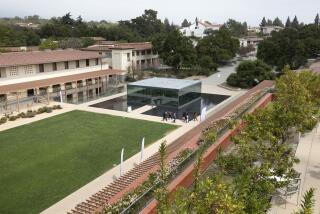George Benson; Former College President
- Share via
George Charles Sumner Benson, author, expert on government administration and founding president of Claremont Men’s College, now known as Claremont McKenna College, has died at the age of 91.
Benson, who was also a high-ranking Pentagon official during the Vietnam War, died Monday at the Pilgrim Place retirement home in Claremont, college officials said Tuesday.
When the college was established in 1946 as the fourth institution in Claremont’s educational cluster, Benson recruited the original faculty and set out to create one of the finest liberal arts schools in the nation. During more than two decades as president, he emphasized training government leaders and developed the college’s special reputation in economics and government.
He also played a leading role in establishing two newer Claremont colleges, Harvey Mudd and Pitzer, and was instrumental in locating the Rancho Santa Ana Botanic Garden in the college town.
In 1969, the active Republican and longtime supporter of President Richard M. Nixon resigned from Claremont Men’s to accept a Nixon appointment as deputy assistant secretary of defense for reserve affairs.
After his successor at the college, Howard R. Neville, was asked about dealing with the campus’ militant and minority students in that anti-Vietnam War protest era, Benson told The Times:
“It’s a far different world from when I took the job 23 years ago. Then you had to worry about the trustees and the faculty. Now the question is ‘How will the new man get along with the students?’
“Fifteen years ago,” he added, “if we heard there was a threat of a panty raid, I’d go out and tell the students: ‘If you go into the women’s dorm, I’ll throw you out.’ Now the president is reduced to something like a political leader. He can’t suspend or expel students. It goes through a faculty-student tribunal.”
But Benson was also a master of politics and negotiation. During his three-year Washington tenure, antiwar protests exploded across the country, particularly on college campuses. Yet he managed to persuade many universities to maintain their Reserve Officer Training Corps programs through those troubled years.
Benson returned to Claremont in 1972 and devoted himself to writing. Over half a century, he wrote eight books on American government and politics and contributed many articles of political analysis to The Times’ op-ed pages.
During his retirement, he drew on his background as son and grandson of ministers in writing a trilogy on ethics that aided a national movement to teach the subject on campuses. The books were “Amoral America” in 1975, “Political Corruption in America” in 1978 and “Business Ethics in America” in 1982.
Benson’s best-known book was “The New Centralization,” published in 1941, which questioned the concentration of power in the federal government.
The government scholar was research director for President Dwight D. Eisenhower’s Commission on Intergovernmental Relations in the 1950s. In California, he was active in the Republican Associates of Los Angeles, served as president of a group known as the California Congressional Recognition Plan and headed all the congressional campaigns of Rep. David Dreier (R-San Dimas), now chairman of the House Rules Committee.
Dreier remembered Benson in a statement Tuesday as “a visionary leader with incredible intellect and a heart to match.”
Born in New York City, Benson grew up in Ukiah, Calif., and graduated from Pomona College, which was founded by his grandfather, Charles Burt Sumner. Benson earned a master’s degree from the University of Illinois and a doctorate in government at Harvard.
He taught at Harvard, the universities of Michigan and Chicago and Northwestern University and did research for the Council of State Governments, based in Chicago. He was an Army officer during World War II, handling distribution of food to occupied areas of Italy and Austria.
Widowed twice, Benson is survived by two sons, Brien and Sumner; stepson Jack Lowe; and three grandchildren.
The family has asked that memorial donations be made to Claremont McKenna, Rancho Santa Ana Botanic Garden or the Episcopal Diocese of Los Angeles.
A memorial service is scheduled at the Garrison Theater, 231 E. 10th St., Claremont, at 11 a.m. April 3.
More to Read
Sign up for Essential California
The most important California stories and recommendations in your inbox every morning.
You may occasionally receive promotional content from the Los Angeles Times.













